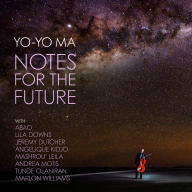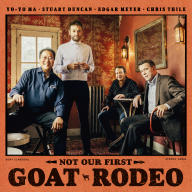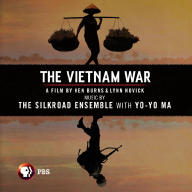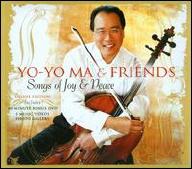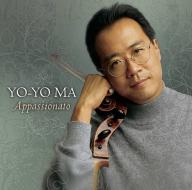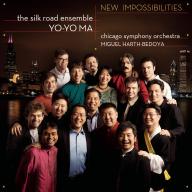Yo-Yo Ma was born in Paris, France in 1955. The child of two musicians, he began music lessons very early, trying piano and all the string instruments before settling on cello. His first public performance was at the age of five. Ma's family moved to New York when he was seven so he could study with Janos Scholz. Before the age of ten, Ma had performed for Dwight D. Eisenhower and John F. Kennedy, and had appeared on television with his sister in a concert led by Leonard Bernstein and on The Tonight Show. Ma became a student of Leonard Rose at Juilliard, but did not complete his studies there. Inspired by seeing the commitment of nonagenarian Pablo Casals at the Marlboro Festival, he enrolled at Harvard to finish his bachelor's degree, graduating in 1976.
Following Murray Perahia and Lynn Harrell, Ma became the third recipient of the Avery Fisher Prize in 1978. A year later, he made his recording debut as main artist with Finzi's Cello Concerto alongside the Royal Philharmonic Orchestra. He then signed with CBS Masterworks and followed with recordings of Saint-Saëns, Haydn, and Beethoven (Sonatas 1 2, with Emanuel Ax), among others, before 1983's J.S. Bach: The 6 Unaccompanied Cello Suites proved to be his breakout. He returned quickly with more Beethoven sonatas with Ax and a Schubert quintet album with the Cleveland Quartet as well as Claude Bolling's Suite for Cello Jazz Piano Trio. He also recorded an album of Japanese Melodies with accompaniment by bass, percussion, and flute. In 1985, he released Elgar and Walton's cello concertos, performed with André Previn and the London Symphony Orchestra. Some of his other albums in the '80s included recordings with Seiji Ozawa and the Boston Symphony Orchestra, Lorin Maazel, and the Berlin Philharmonic, and, in 1988, Brahms' Double Concerto with violinist Isaac Stern and the Chicago Symphony Orchestra led by Claudio Abbado. The following year brought Anything Goes: Stephane Grappelli Yo-Yo Ma Play (Mostly) Cole Porter.
In the 1990s, amid a stream of at-least-annual classical releases, Ma continued to raise his profile with mainstream audiences on crossover albums such as 1992's Hush, with vocalist Bobby McFerrin. Issued by Sony, that record reached the top half of the Billboard 200 and was followed by a duo tour. In 1996, he appeared with bassist Edgar Meyer and violinist Mark O'Connor on the folk-inspired album Appalachian Journey, which went to number one on the Billboard classical chart. The year 1997 saw Soul of the Tango featuring the music of composer Astor Piazzolla, and Ma was the featured soloist on composer Tan Dun's Symphony 1997 (Heaven, Earth, Mankind) and on John Williams' score for the film Seven Years in Tibet. That year, he also appeared on the soundtrack to the documentary mini-series Liberty!, which featured O'Connor along with Ma, trumpeter Wynton Marsalis, and singer/songwriter James Taylor. In 1998, he returned to the Bach suites with Inspired by Bach: The Cello Suites, recorded for six short films in collaboration with director Atom Egoyan, ice dancers Torvill and Dean, dancer Mark Morris, and other artists. He then recorded 1999's Simply Baroque with the Amsterdam Baroque Orchestra, and they followed it a year later with Simply Baroque II. Also in 2000, he reunited with O'Connor and Meyer for Appalachian Journey (another classical number one) and with Tan Dun for the soundtrack to Ang Lee's Crouching Tiger, Hidden Dragon. After establishing the Silk Road Ensemble to bring together musicians from diverse cultural backgrounds along the ancient Eurasian trade route, he issued Silk Road Journeys in 2001. Credited as Yo-Yo Ma & the Silk Road Ensemble, they presented music such as a Mongolian love song, traditional Chinese songs, and Finnish folk songs. That year, Ma was awarded the National Medal of the Arts by the NEA.
In 2002, Sony Classical released Yo-Yo Ma Plays the Music of John Williams, an original recording produced and conducted by Williams. That year, Silk Road Ensemble cracked the Billboard 200 with Silk Road Journeys: When Strangers Meet, and Ma's cello could be heard on Philip Glass' score for the film Naqoyqatsi. Featuring over a dozen guests, including bossa nova singer Rosa Passos and the guitar duo of Sergio Odair Assad, Obrigado Brazil arrived the following year and returned him to the top of the classical chart. He released a concert version of the album in 2004, a year that also saw Silk Road Journeys: Beyond the Horizon, Vivaldi's Cello, and Yo-Yo Ma Plays Ennio Morricone. The latter two charted on the Billboard 200. A year later, he appeared with Itzhak Perlman on the John Williams film score Memoirs of a Geisha. It, too, landed on the U.S. album chart. Silk Road Ensemble's New Impossibilities was recorded at Symphony Center with the Chicago Symphony Orchestra in 2007, and 2008's Yo-Yo Ma Friends: Songs of Joy Peace featured collaborations with names like Dave Brubeck, Renée Fleming, and Diana Krall, just to name a few. It was Ma's highest-charting album to that point, reaching number 20 on the Billboard 200. After an appearance at Barack Obama's 2009 inauguration, he climbed two spots higher with 2011's The Goat Rodeo Sessions, an album with Meyer, Stuart Duncan, and Chris Thile that also marked Ma's debut on the Bluegrass Albums chart. That year, Ma was also a recipient of a Kennedy Center Honor, the Glenn Gould Prize, and the Presidential Medal of Freedom.
Another Silk Roads Ensemble album, A Playlist Without Borders, followed in 2013. Issued in 2015, Songs from the Arc of Life presented well-known classical tunes such as Schubert's (and Bach-Gounod's) Ave Maria and Brahms' Lullaby. It went to the top of the classical chart, as did Silk Road Ensemble's 2016 LP Sing Me Home. His next classical number one came just a year later with Bach: Trios, a set of keyboard pieces rearranged for Ma on cello, Meyer on bass, and Thile on mandolin. In 2017, the Silk Road Ensemble with Yo-Yo Ma performed the music for the Ken Burns-Lynn Novick documentary series The Vietnam War, and Ma collaborated with chamber orchestra the Knights on Azul. It offered a performance of the Osvaldo Golijov concerto alongside pieces by Dvorák, Karlheinz Stockhausen, and Sufjan Stevens, among others. In 2019, Ma issued Six Evolutions: Bach Cello Suites, his planned final studio recording of the famed suites. He then reunited with Chris Thile, Edgar Meyer, and Stuart Duncan for 2020's Not Our First Goat Rodeo. During the coronavirus lockdowns, Ma and Ax held spontaneous recitals for essential workers. When regular concerts resumed in 2021, the two joined violinist Leonidas Kavakos at Tanglewood with an impressive trio arrangement of Beethoven's Symphony No. 2. Based on that performance, the trio started a successful series of recordings, Beethoven for Three, in 2022. ~ Marcy Donelson & Patsy Morita, Rovi


